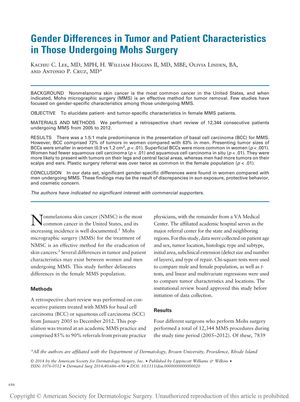Gender Differences in Tumor and Patient Characteristics in Those Undergoing Mohs Surgery
June 2014
in “
PubMed
”

TLDR Men are more likely to have larger basal cell carcinomas and squamous cell carcinomas, while women have more superficial basal cell carcinomas and tumors on their legs and central face.
In a retrospective chart review of 12,344 patients who underwent Mohs micrographic surgery between 2005 and 2012, researchers found significant gender differences in tumor and patient characteristics. Men had a higher incidence of basal cell carcinoma (BCC) with a ratio of 1.5:1 and tended to present with larger BCCs (1.2 cm²) compared to women (0.9 cm²). Women had a higher proportion of BCCs (72%) than men (63%) and were more likely to have superficial BCCs. Men had more squamous cell carcinomas (SCC) and SCC in situ. Tumor location also varied by gender, with women more frequently having tumors on their legs and central face, while men had more on their scalps and ears. Additionally, women were more than twice as likely to be referred for plastic surgery, suggesting possible differences in sun exposure, protective behaviors, and cosmetic concerns between genders.






